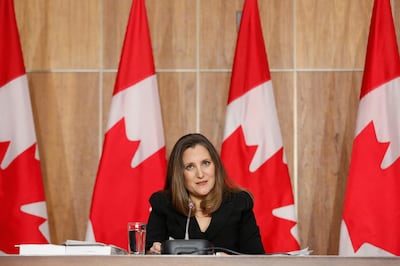Canada's federal budget 2021, which was unveiled on Monday, promises an ambitious nationwide early learning and childcare plan with proposed new investments of up to $30 billion over the next five years.
This will eventually result in a 50 per cent reduction in average childcare fees by the end of 2022, with a view to it costing about 10 Canadian dollars ($8) per day for all regulated childcare spaces across the country by 2025-26.
The new plan also promises "ongoing annual growth" in the number of spaces, as well as "meaningful progress" in the creation of before and after-school care.
"Early learning and childcare has long been a feminist issue," Canada's Finance Minister Chrystia Freeland wrote on Twitter as she outlined her proposals online. "Covid has shown us that it is an urgent economic issue, too."
Early learning and childcare has long been a feminist issue; COVID has shown us that it is an urgent economic issue, too.
— Chrystia Freeland (@cafreeland) April 19, 2021
Inclusivity in childcare
Over the next two years, a proposed CAD$29.2 million will be spent on supporting childcare centres to improve accessibility for children with disabilities, potentially benefitting more than 400 venues. This includes the construction of ramps and accessible doors, washrooms and play structures.
Another major focus of the proposal is addressing the needs of Canada's indigenous families and children. A proposed investment of $2.5 billion will be spent over the next five years on strengthening the country's 2018 framework that promises high quality, culturally appropriate childcare for this demographic.

Melanie Omeniho, president of Les Femmes Michif Otipemisiwak / Women of the Metis Nation applauded Freeland's "historic budget submission", the first presented by a female finance minister in Canadian history.
"This budget assertively invests in improving the wellness, lives and safety of Metis women and girls," Omeniho said in a statement.
The cost of childcare in Canada
At the moment, across some parts of Canada, childcare fees for one child can be as high as rent or mortgage payments, according to the budget.
A 2021 study by the Canadian Centre for Policy Alternatives, which updates the ranking of the most and least expensive cities for childcare in Canada, found that in 2020, families were paying on average more than CAD$1,000 per month in cities such as Calgary and Vancouver, with Toronto topping the list at more than CAD$1,700 per month.
"The high cost of childcare ... is a tax on a segment of the population that Canada requires to drive economic growth," reads the budget proposal. "Young families are juggling sky high housing costs, the increasing cost of living, expected to save up for their retirements, while managing childcare fees."

The only exception is in Quebec, where childcare is already subsidised. When the Quebec Educational Childcare Act was introduced in 1997, the province's women's labour force participation rate was four percentage points lower than the rest of Canada.
Today, it is four points higher, women with children under 3 have some of the highest employment rates in the world and studies have shown childcare has raised its GDP by 1.7 per cent, according to the budget proposal.
Why the focus on childcare?
"This is an economic issue as much as it is a social issue," states the proposal by Canada's Department of Finance.
Particularly amid the pandemic, full-time licensed childcare in most Canadian cities has been struggling under the financial burden caused by Covid-19, according to the study by CCPA. It noted a dramatic drop in enrolment as for-profit centre fees remain unaffordable.
"Without access to childcare, parents cannot fully participate in our economy," reads the proposal. "This is a legacy investment for today's children who will not only benefit from, but also inherit this system."
Ultimately, the idea is that this new early learning and childcare plan will drive economic growth, secure women's place in the workforce and give every Canadian child the same head start.
It also aims to promote gender equality and increase labour force participation rates of women, adding approximately 240,000 workers in today's terms, thereby driving an increase in real per capita GDP by as much as 1.2 per cent.
“After 50 years of talking about it and fighting for it, we’re finally going to get it done,” Freeland told reporters as she unveiled the plan in the House of Commons on Monday.







